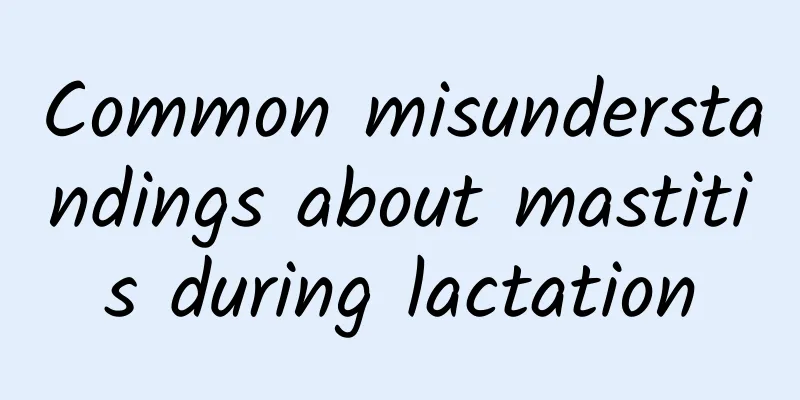Common misunderstandings about mastitis during lactation

|
When it comes to lactation mastitis, many breastfeeding mothers will be shocked and recall the sufferings they have endured, how they have endured sleepless nights, high fever of 39 degrees Celsius, pain, and mental oppression from people around them, before they can calmly say to you, "I understand." Maybe we have taken some detours, maybe we don't need to endure some pain, about the common misunderstandings about lactation mastitis, today we will learn one by one: First: If you have mastitis during lactation, should you immediately seek help from a lactation consultant to drain your milk? NO! The cause of mastitis during lactation is generally milk stasis, and there are many factors that cause milk stasis. The most common ones are nipple damage caused by improper breastfeeding posture, bacteria invading the breast, or mother-child separation, too long intervals between feedings; or trauma, squeezing or collision; and some may be due to fatigue, poor sleep, bad mood, etc., which may cause mastitis during lactation. We must solve the problem from the root according to different reasons, and we cannot pin our hopes on the lactation consultant to perform manual milk discharge, so that we can get twice the result with half the effort. Second, if you have mastitis during lactation, you can no longer breastfeed. Is this poisoning the baby? NO! When a breastfeeding mother gets mastitis, everyone is most worried about affecting the baby. Although breast milk is the best food for young babies, after suffering from mastitis, it is inevitable to worry that there will be bacteria and viruses in the breast milk, which will bring harm to the baby. In fact, when a breastfeeding mother suffers from mastitis, the body will produce a lot of white blood cells, which are the guards to protect our health. It will kill all the bacteria that invade our body, so as to help us recover. Of course, this process also faces the sacrifice of many white blood cells, especially when pus is formed, which will change the taste of breast milk, a little salty. You should know that our normal breast milk is a little sweet. The baby may refuse to breastfeed because of the different taste. This does not mean that we can't breastfeed. On the contrary, in the early stage of mastitis, we encourage frequent breastfeeding, because we mentioned earlier that the cause of mastitis is milk stasis. If we don't breastfeed, the milk stasis will be more severe and the inflammation will be more serious than before. Therefore, if the mother's body allows, breastfeeding is encouraged, which can not only bring the best food to the baby, but also help the mother recover. Third, if you have mastitis during lactation, do you need to apply heat to relieve the inflammation? NO! In traditional concepts, when we think of inflammation and pain, we always think of hot compresses first. Indeed, proper hot compresses can increase blood circulation and relieve pain, but when mastitis occurs during lactation, we encourage cold compresses. Why? Because the cause of mastitis is milk stasis. If blood circulation is accelerated, milk components are more likely to enter the milk ducts through the gaps opened by inflammation, aggravating the swelling of the breasts and making it more difficult to discharge. The principle of cold compresses is to cool down the swollen breasts through the effect of thermal expansion and contraction, making them less swollen, and the milk ducts will naturally be unobstructed, making it easier for milk to be removed. Fourth, if you take medicine for mastitis during lactation, you can’t breastfeed? NO! In the outpatient clinic, for lactation mastitis, doctors generally recommend taking antibiotics, painkillers, antipyretics, etc., which are safe during lactation. Antipyretics and analgesics such as cephalosporins, penicillin antibiotics, ibuprofen, acetaminophen, etc. can be used even when the baby is sick and will not affect continued breastfeeding. Of course, there are also various reasons why the use of some inappropriate medications will affect the baby through breast milk. At this time, we will recommend suspending breastfeeding after 5 half-lives of the drug. The doctor will discuss with the mother and decide when to breastfeed again. Fifth, I have mastitis during lactation. Should I wean myself to get better faster? NO! This is also a misunderstanding of many people, who think that repeated fevers and pains are too uncomfortable, so at worst I can stop breastfeeding and stop suffering. I hope I can get better quickly by weaning. In fact, just like we don’t have a lot of milk so soon after giving birth, the amount of milk increases slowly, and it won’t disappear all at once. It also needs to be reduced slowly. Even if someone uses drugs to stop breastfeeding, there won’t be no milk at all in a few days. The cause of mastitis is milk congestion. In the days before stopping breastfeeding, milk is still being produced, but it is not removed, so it will accumulate inside and aggravate the inflammation. Breastfeeding mothers have a great and hard life. They need the understanding and support of their family, as well as professional guidance and advice during breastfeeding. I hope that this scientific knowledge can provide some help to mothers and help them keep their babies fed! |
>>: Is it true that I can no longer speak after laryngeal cancer surgery?
Recommend
Why does my stomach bloat and menstruation not come?
Girls always encounter a few special days every m...
What is the cause of dark brown discharge during late menstruation?
All physical reactions of women during their mens...
Why can't I open my uterus after 3 days of pain?
We all know that during childbirth, the cervix ne...
What is a simple and effective way to treat vaginal flatulence?
The so-called vaginal flatulence refers to the ph...
What should I do if sand gets into my eyes?
What should we do when sand is blown into our eye...
Diagnosis of fibrocystic breast
Many of you may not have heard of this disease. B...
What is the best medicine for scrotal itching?
For most men, the scrotum is the most vulnerable ...
Genes are also divided into "long and short"? It's related to aging! New research finds that short genes are more active than long genes
Author: Duan Yuechu Your browser does not support...
Why is the pot-baked pork not evenly coated? What should I do if the pot-baked pork is not evenly coated?
We all know that sweet and sour pork is a common ...
What anti-inflammatory drugs should be used after the fallopian tube infusion?
There are currently many types of anti-inflammato...
How tall can you grow if you have your period at the age of 10?
Generally speaking, girls will experience menarch...
The impact of breastfeeding during fever on children
In daily life, many adults and children have feve...
Why is the fetal movement below the lower abdomen?
Feeling the baby's fetal movement during preg...
What tests should be done if the leucorrhea is yellow and has a fishy smell
If the leucorrhea is yellow and has a fishy smell...
Treatment for delayed menstruation for 19 days
In daily life, as women's bodies are relative...









